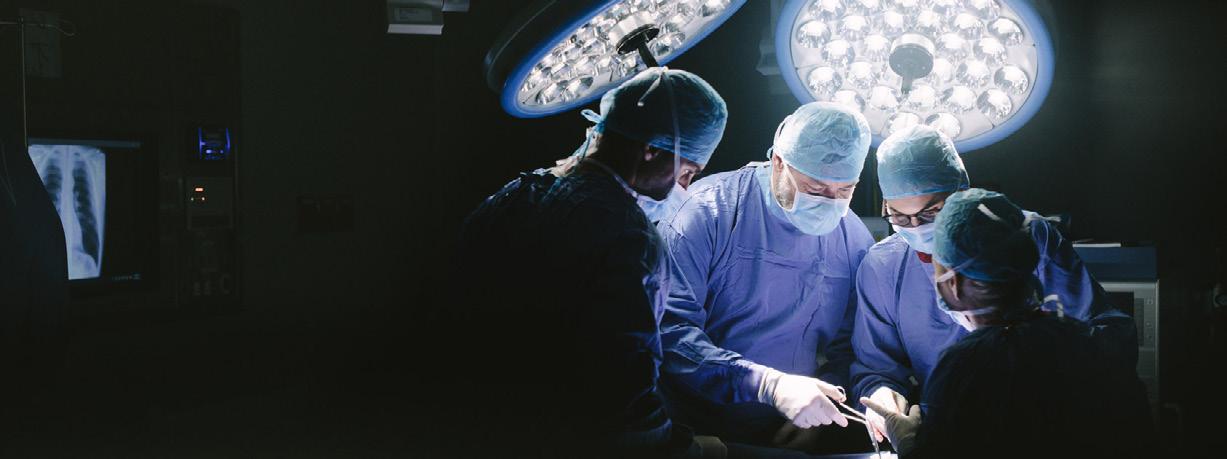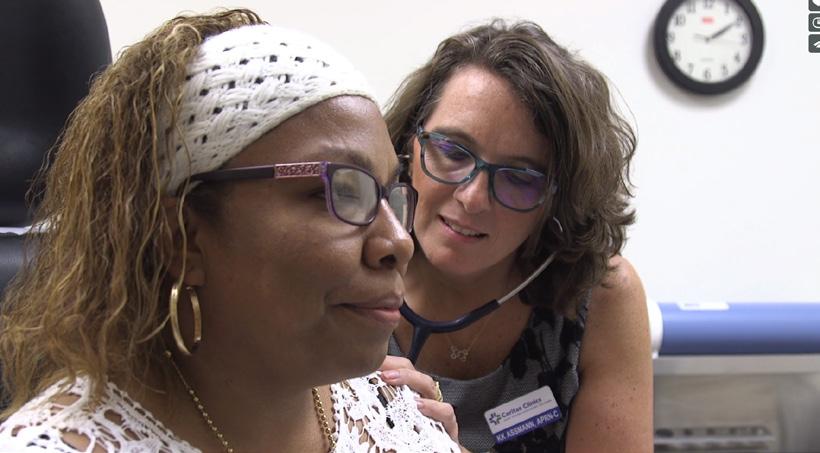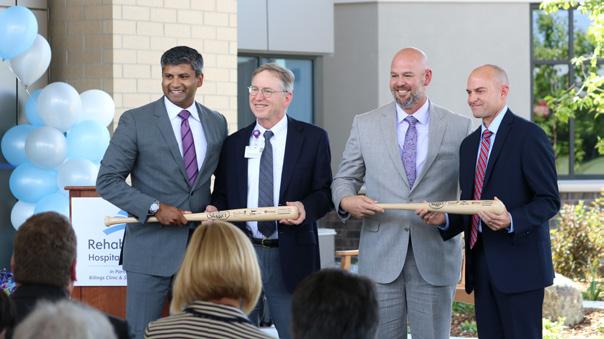
6 minute read
Clinical & Operational Transformation
Section 1 Our Strategic Imperatives
C l i n i c a l & T r a n s f o r m a t i o n O p e r a t i o n a l
Advertisement
N e t w o r k A l i g n e d C l i n i c i a n Healthcare continues to undergo rapid changes, with hospitals and healthcare systems everywhere feeling a number of very real pressures. This is also a time of great opportunity to take new approaches to operations and delivery of care to patients. The next version of the SCL Health strategic plan was designed to do just that. It will help guide the way we advance and change patient care, operations and cost structures to make healthcare better and more affordable.
Last year, Jennifer Alderfer, President of Good Samaritan Medical Center, was selected to lead this effort and build a diverse and experienced Clinical and Operational Transformation Team across the system. Fortunately, there is no shortage of creative ideas, expertise and energy to advance this work. Several new care delivery and operations approaches have already been identified and put into place to help eliminate waste, reduce costs and create better ways to do things across our ministry – all to benefit care teams and patients.
Breaking down silos to enhance surgical care and recovery
Across SCL Health, more than 47,386 surgeries were “Traditionally, we have looked at each phase performed in 2019. And for every surgery performed, of care in isolation. This initiative allows us to patients typically interact with 80 caregivers during their medical experience. To ensure surgical patients receive the best outcomes from their procedures and have the look at the whole continuity of care and think long-term about the patients’ experience so best chance to return back to their normal lives, we must that they will have a better experience in each continue to evolve our delivery of care and focus on the phase of care.” whole team and process, not just the surgeons and the Ben Jagodzinski, MD, an anesthesiologist surgery. This work begins before surgical patients come at St. Vincent Healthcare into the hospital and will not end until they fully recover. is going through from start to This model of care is called finish,” says John Eisenach, MD, Enhanced Recovery After Surgery Anesthesiology, Good Samaritan (ERAS) and focuses on using Medical Center. “When we each patient-centered, evidence-based know what the other is doing, then approaches across multidisciplinary we can understand and develop teams to address every phase of the true empathy for what these patients surgical process for the benefit of are going through so that we can the patient’s recovery. “We need all of those 80 people to understand what the patient Watch an online video of this story. Visit: sclhealthreport.org then standardize, streamline and optimize our care, which will then drive outcomes.”

Empiric Health partnership taps into big data to increase surgical efficiency, quality
The Clinical and Operational Transformation Team embarked on an additional initiative: They partnered with analytics leader Empiric Health in 2019 to help SCL Health surgical teams improve their surgical outcomes and lower patient costs. Teams now have access to thousands of data points, expanded through the use of technology, like machine learning and artificial intelligence. This helps surgeons identify ways to improve efficiency and quality for all phases of surgical procedures by using the data to help make decisions.
“The data made available through Empiric Health assists our providers in overcoming the traditional problem of surgical-data variation due to individual patient differences,” says Simon Payne, MD, Chief Medical Officer, Clinical and Operational Transformation, for SCL Health. “Openly sharing data that our providers and surgeons trust affords us a tremendous opportunity to evaluate variability, to continue our commitment to enhancing our quality excellence – including improvements in surgical quality and perioperative efficiency – and to ultimately reduce surgical cost.”
Good Samaritan Medical Center and St. Mary’s Medical Center were the first two hospitals to begin using Empiric Health’s data, with plans for additional SCL Health hospitals to go live with the technology over the next two years. The collaboration with Empiric Health is just one of the many ways SCL Health continues to find new solutions to transform how we bring high-quality and affordable care to our patients.
When timing is everything: Length of stay optimization improves patient outcomes, experience
It may seem counterintuitive to think shorter hospital stays could lead to better patient outcomes and reduced costs, but that’s exactly the case. Efficient care translates to high-quality care because it reduces risks for hospitalacquired conditions (a medical condition or complication a patient develops during a hospital stay), returning to the hospital – and even death. In addition to health risks, the longer a patient stays hospitalized, the greater the overall cost of care.
Optimizing length of stay requires careful planning and a team-based approach focused on continuity of care (the quality of a patient’s care over time). Across SCL Health, length of stay optimization has been set as a top initiative to provide the best possible experience for patients and to support the best use of our resources.
Improving the hospital discharge process
Patient surveys have regularly pointed to hospital discharge as an area where we could do better – and SCL Health is working hard to do just that. One of the ways we’re doing this is through better care coordination among people and processes when we discharge each patient, ensuring collaborative communication and a safe and timely departure when patients are ready to leave the hospital.

“When we align our initiatives around length of stay, we’re closely looking at readmissions and to the things that might not equate to a safe discharge,” says Kathy Crabtree, MD, at Lutheran Medical Center. “I think our care sites are doing a great job of pulling that all in.”
Lutheran Medical Center created a Discharge Navigator Program for each of their clinical units, which includes multidisciplinary huddles each morning and afternoon. Following their lead, five other SCL Health hospitals developed their very own program in 2019. Discharge Navigators help patients get home – or to the next point of medical care – comfortably, safely and without unnecessary delay. And that makes for healthier, happier patients.
SCL Health delivers cutting-edge cancer care with precision
We’ll never stop searching for new ways to advance person-centered care and transform the experience for our oncology patients. Precision oncology, which uses information from a person’s genetic profile to help drive treatment decisions, is just one way we do this.
Through a partnership with Strata Precision Oncology Network, we now offer our patients treatments specifically designed to target their unique form of cancer. Eligible patients benefit from the comprehensive treatment program for personalized cancer care at no additional cost. This includes routine testing, rapid interpretation of test results and the ability for patients to participate in clinical trials.
“As our understanding of cancer becomes more complex, the advent of targeted therapies and immune-based therapies allows us to look at the genes that drive cancer. This has led to a whole new class of medications that enable us to treat cancer in a more precise way with potentially fewer side effects,” says Alan Miller, MD, Chief Medical Director of Oncology and Associate Chief Medical Director of Clinical Research for SCL Health.
SCL Health is one of only two health systems in Colorado and the only health system in Montana to be part of Strata Precision Oncology Network.

Alan Miller, MD, Chief Medical Director of Oncology and Associate Chief Medical Director of Clinical Research for SCL Health










